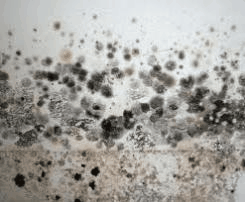As the final post in our series “Why Window Wells?” we would like to discuss one more benefit that window wells can add to your basement and home – ventilation.Basements require adequate ventilation to ensure high-quality indoor air. Ventilation allows stale air to escape and removes excess moisture from basement surfaces. Proper ventilation is essential to prevent structural damage and ensure a healthful environment.

Black Mold on Drywall
Ventilation prevents the buildup of toxic black mold. Black mold spores have been linked to a variety of health problems that range from headaches to severe allergic reactions and breathing difficulties. These spores circulate in the air and seep through the basement’s ceiling into the home’s upper levels. High concentrations of mold spores and other types of fungi, besides causing human illness, cause rotting of structures and weaken the home.Proper ventilation also lowers concentrations of radon, a cancer-causing radioactive gas that occurs naturally as part of the decomposition process of uranium in certain soils. This non-explosive gas has no color, odor or taste. The levels of radon gas in outdoor air are not problematic. However, when radon gas accumulates in areas with poor air circulation, it sometimes causes long-term health issues. Good basement ventilation prevents harm from radon that seeps into the basement and ensures a healthier atmosphere for all levels of the home. Radon, found in soils throughout the United States, has been identified by the Environmental Protection Agency as the cause of more than 20,000 deaths per year.Statistics from the
American Lung Assocation show radon to be a leading cause of death from lung cancer, second only to cigarette smoke. Not all homes, however, have high concentrations of radon. Radon test kits can determine whether a problem exists.The predominant means of entry of radon gas into a home is by pressure.

Radon Test Kit
Air-to-air heat exchangers, because they maintain an even rate of air pressure in the home, do not function well to reduce the amount of radon in basements. Opening a window, however, provides a pressure break and slows gas entry. Although some mechanical ventilation may be necessary at times, opening basement windows is a simple, natural way to increase basement air circulation. Egress window wells provide space for basement windows to access outdoor air. As well as providing great ventilation for your basement, an egress well is a stylish addition to any basement.Results of a study published in 1992, performed by the Air and Energy Engineering Research Laboratory for the Environmental Protection Agency and entitled “
Natural Basement Ventilation as a Radon Mitigation Technique,” illustrated that a significant reduction of radon occurs simply by keeping a single basement window open. In the study, additional winter heating costs were less than what it would cost to install and operate a subslab radon mitigation system. When using the open-window technique, it is recommended that homeowners also keep a window open on each level above the basement to reduce radon infiltration on those levels.
Nothing improves indoor air quality better than fresh outdoor air. Being indoors with windows open gives a feeling of relaxation and well-being that is unsurpassed. Basement egress wells, besides providing light and a means of emergency escape, allow homeowners to make use of natural air to keep home construction strong and the indoor environment safe and comfortable.

